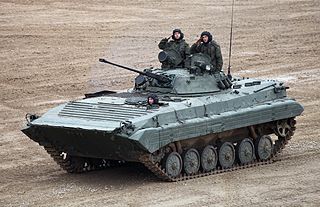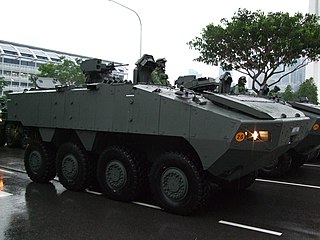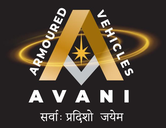
The BMP-2 is an amphibious infantry fighting vehicle introduced in the 1980s in the Soviet Union, following on from the BMP-1 of the 1960s.

The Patria AMV is an 8×8 multi-role military vehicle produced by the Finnish defence industry company Patria.

The Mowag Piranha is a family of armoured fighting vehicles designed by the Swiss company Mowag.

The Arjun is a third generation main battle tank developed by the Combat Vehicles Research and Development Establishment (CVRDE) of the Defence Research and Development Organisation (DRDO), for the Indian Army. The tank is named after Arjuna, the archer prince who is the main protagonist of the Indian epic poem Mahabharata. Design work began in 1986 and was finished in 1996. The Arjun main battle tank entered service with the Indian Army in 2004. The 43rd Armoured Regiment, formed in 2009, was the first regiment to receive the Arjun.

The Terrex Infantry Carrier Vehicle (ICV) is an armoured fighting vehicle (AFV) developed by ST Engineering of Singapore and Timoney Technology of Ireland, and produced by ST Engineering Land Systems for the Singapore Army as well as by Turkish auto-maker Otokar as the Yavuz (AV-82) for the Turkish military.

The Pandur II is an improved modular all-wheel-drive version of the Pandur 6×6 APC wheeled armoured vehicle. It was developed as a private venture by the Austrian company Steyr-Daimler-Puch Spezialfahrzeuge. Steyr-Daimler-Puch Spezialfahrzeuge is part of General Dynamics European Land Systems (GDELS), which is also the parent company of MOWAG of Switzerland and Santa Bárbara Sistemas of Spain.

The KTO Rosomak is an 8×8 multi-role military vehicle produced by Rosomak S.A., a Polish Armaments Group company, in Siemianowice Śląskie. The vehicle is a licensed variant of the Finnish Patria AMV.
Combat Vehicles Research and Development Establishment (CVRDE) is a laboratory of the Defence Research and Development Organisation (DRDO). Located at Avadi, in Chennai, India. It is the main DRDO lab involved in the development of armoured fighting vehicles, Tanks, Automotive electronics and many other.
Vehicle Research and Development Establishment (VRDE) is a laboratory of the Defence Research & Development Organization (DRDO) located at Vahannagar near Ahmednagar. Its primary function is research and development of various light tracked, wheeled and specialised vehicles for defence applications.

Abhay was an Infantry Combat Vehicle created under a tech-demonstration program started in India by the Defence Research and Development Organisation or DRDO. As its first IFV project, Abhay was designed to provide experience in the construction of AFV components to DRDO, serve as a replacement to India's vast BMP fleet used in its Mechanised Infantry Regiments, and serve as a test bed for weapons and systems to be used on future vehicles, as well as to be a reference for the designs of future vehicles.

The Piranha V infantry fighting vehicle (IFV) is the fifth generation variant of the Mowag Piranha family of vehicles. It was designed by General Dynamics European Land Systems - Mowag GmbH. The first prototype was completed in 2008. It was first introduced during the Eurosatory exhibition in 2010.
FNSS Savunma Sistemleri A.Ş. is a Turkish defense manufacturer founded in 1988. It is owned 51% by Nurol Holding of Turkey and 49% by British–American firm BAE Systems Inc., and operates facilities located in Gölbaşı, Ankara.
Ordnance Factory Medak (OFMK), previously called Ordnance Factory Project Medak (OFPM) while in its development stage, is a factory owned by Armoured Vehicles Nigam Limited, a company that manufactures armoured vehicles and was one of the 41 Indian ordnance factories under the erstwhile Ordnance Factories Board of the Ministry of Defence, controlled by Government of India.

The Type 08 is a Chinese family of modern eight-wheeled, amphibious, modular armored vehicles developed by Norinco for infantry fire support, battlefield logistics, and quick reaction operations. Developed in the early 2000s, the vehicle family were produced for more than 6,000 hulls and widely deployed by the People's Liberation Army Ground Force and People's Liberation Army Marine Corps.

The ATOM is a heavy 8×8 infantry fighting vehicle (IFV) jointly developed by the Russian company Petrel and the French company Renault Trucks. The vehicle is established on the basis of the French Véhicule blindé de combat d'infanterie (VBCI) IFV which is produced by Renault. The prototype of the ATOM was first unveiled during the 2013 Russian Arms Expo at Nizhny Tagil, equipped with a unique fighting module.

The K808/806 White Tiger wheeled armored personnel carrier (APC) is family of 8x8 and 6x6 armored vehicles. Developed by Hyundai Rotem as a private venture in 2012, the Korean Army declared a plan to acquire 600 6×6 and 8×8 wheeled APCs in order to help build rapid response forces molded after U.S. Stryker combat brigades, according to the Defense Acquisition Program Administration (DAPA).

Mahindra Armored Light Specialist Vehicle is a light-weight four-wheel drive air transportable tactical armoured specialist vehicle designed by Mahindra & Mahindra for the Indian Army and the Indian Special Forces. It's a modular type vehicle built to be maintenance friendly, and can be upgraded and configured for wide range of roles.

Armoured Vehicles Nigam Limited (AVANI) is an Indian public sector defence company, headquartered in Avadi, Chennai established in 2021 as part of the restructuring and corporatisation of the Ordnance Factory Board into seven different Public Sector Undertakings. AVANI primarily manufactures Armoured fighting vehicles, Main battle tanks and their engines for the use of the Indian Armed Forces and foreign militaries.
















